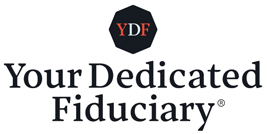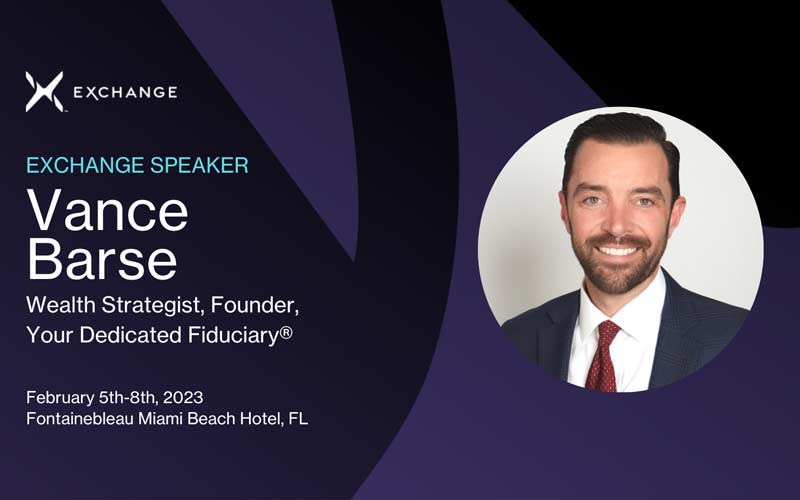Exchange is coming February 5–8, so Evan Harp is talking with some of the advisors who will be there. Today’s edition is focused on Vance Barse, Founder and Wealth Strategist of Your Dedicated Fiduciary.
Evan Harp: When and how did your practice begin?
Vance Barse: My practice began somewhere between Sturgis, South Dakota and Denver, Colorado. I spent about a decade consulting leading financial advisors and wealth management firms all around the country in my former career role, and after a few transformational life events happened, which I’ll describe in more detail in a bit, I decided to resign from that career and set out on a Harley Davidson ride around the country for a little over a year.
I remember leaving Sturgis to ride south to Denver and thinking, “You know, I have a whole bunch of unusual knowledge about the financial services industry floating around in my head, so I’ll try my hand at serving as a fiduciary financial planner.” The decision to start my firm occurred while riding on Route 26 in Wyoming out on the open road with ZZ Top playing in the background.
When I finally got back to San Diego, I opened up shop. I had zero clients and zero assets under management. I literally never had a direct conversation with individual investors without their advisor being present because, for a decade, my clients were financial advisors, wealth management firms, chief investment officers, and investment committees. I would meet with advisors and their clients to educate them on how to allocate to institutional alternative investments, such as Citadel, Paulson, SAC, Winton, Brevan Howard, QIM, and others. In that role, I learned as much as I could about what wealth management firms were (and were not) doing for their clients. It was a little bit of a rough start, because it took some time to realize that most clients don’t care how the mousetrap works or the engine is designed: they largely want to know they can live a well-deserved retirement and pass their assets tax efficiently to their heirs without the beneficiaries fighting over them. Eight years later, we now have 60 typically multigenerational families that we serve nationwide, and we help families navigate all dollar sign-related decisions.
Evan Harp: What is your investment philosophy?
Vance Barse: Data should drive decisions in my opinion. One of the most fascinating debates to me is active versus passive management, because in my view, the data should really drive what portion of a portfolio is active, and what portion is passive.
When I look at historical return streams, and of course, none of these are forward looking statements – typically, I want low-cost and tax-efficient holdings because time value of money and compound interest are real. A lot of the money that we steward is non-qualified, meaning taxable, and because of that, and given that many of the families we serve are in high tax brackets, we generally prefer tax-efficient investments. But, for qualified accounts, sometimes active management has historically outperformed passive in certain sectors, which can make active management more appealing. Part of our job, though, is monitoring these things on an ongoing basis.
Broadly speaking, when it comes to US stocks, we like generally like a mix of passive and individual equities, and our allocations to specific sectors have evolved ever since this whole inflationary period reared its head. When we look at international exposure, we typically prefer active management for retirement accounts and passive for taxable accounts. Ultimately, Evan, how we satisfy exposure to certain sectors is driven by the type of account and the tax profile of the client.
Evan Harp: What was the biggest obstacle you had to overcome and how did you do it?
Vance Barse: Learning that, ultimately, in life, there are only three things that I can control. The first is my attitude, which can often be difficult, particularly in bumper-to-bumper traffic (laughs). The second is the action or actions that I take. We cannot manifest change without actually taking action and I found that people, myself included, often move at the speed of pain. And the third is acceptance. Life is what happens to us as we are trying to implement our plans. It took me 35 years on this earth to finally accept that. It’s reality, right? I just remember thinking that my purpose in life was to raise capital and consult the so-called leading financial advisors and wealth management firms nationwide. In an 18-month period, I had five family members transition to the spiritual side. Three of them were very close. One of them was the biological father, whom I had never actually met in person. My grandmother had a massively debilitating stroke which prompted me to resign from my former career and really evaluate how I wanted to live my life. I mean, it was just…(pauses)…a very challenging time. But from that 2014 to 2015 period came the wisdom that I needed to live the balance of my life with meaning and fulfillment, and I’m happy to report that is now my raison d’etre. I am now able to spend the quality time with my wife and children in a way that I will never take for granted because time with them is something I can never get back.
Evan Harp: Exchange is slated for February 5–8. What do you think the biggest story in the market will be at that time?
Vance Barse: The Fed, the Fed, the Fed. Most people, I think, would say inflation. But that is sort of the leading variable. In response to inflation, people are curious to know what the Fed will do with respect to monetary policy, because we had 13 years of “quantitative pleasing” – hat tip to my friend, Danielle DiMartino, for that term. Many investors and capital allocators became conditioned to expect this ZIRP (zero interest rate policy) and TINA (there is no alternative) environment. Now that inflation has reared its ugly head, a lot of folks are going to be talking about what the Fed is going to do moving forward.
Evan Harp: Who who’s another financial advisor that inspires you and why?
Vance Barse: Michael Green, because he’s an academic, one of the smartest people I know, and, like, six feet nine. He’s a commanding presence and I have a tremendous amount of respect for the guy.
At Exchange last year, Michael and I sat down to catch up, and he’s one of the few people that I’ve had the opportunity to really take a deep dive into the Fed’s monetary policies, the macro view on the world, and the potential concern around the implications of automated passive investing. He vocalizes questions about passive investing and ETFs that I’ve often thought of late at night and early in the morning. Look at the QDIA, and the extent to which 401k plans default to investing in passive strategies, this whole movement to passive – and I allocate to exchange traded funds, let me be very clear – part of my job, though, is to model out the different scenarios that can happen economically, and how do we plan for that with respect to serving as the in-house fiduciary and financial steward for the families that we serve.
You have to ask yourself, with all the money going into passive, are there things to be concerned about, and understanding the analyses and the evidentiary data is important to consider.
It was really great to talk with Michael Green about all of this. In fact, I met Michael through mutual friend Daniel DiMartino, at a Fed dinner in Manhattan, and Danielle has been hugely inspirational to me for many reasons. She was the in-house adviser to Richard Fisher for many years, including throughout the credit crisis. Danielle left the Fed around the same time that I left my former career role, and it was interesting, because there were a lot of parallels there, but we didn’t meet until several years later. I have a huge amount of respect for the two of them.
Evan Harp: Do you have your eyes on any types of ETFs right now and if so, which ones?
Vance Barse: Yes. It is my opinion that inflation will continue to gradually come down but remain elevated relative to where it’s been since quantitative easing started here in the US. Of course, I could be wrong, and I admit when I am, just ask my wife Jodi (laughs). We have been allocating to ETFs comprised of value equities and companies with a history of increasing their dividends. We have also been using select individual equities that fit the same profile. We continue to have some exposure to growth, but it is our view that we are in a different investing paradigm relative to QE, at least for now. Generally speaking, we don’t get too esoteric in our ETF allocation because of the client base that we serve; but, thematically, we’re looking at ETFs that theoretically would have the ability to help navigate through the disinflationary environment through which we continue to evolve. We also like certain sectors of international equities that may benefit from a falling dollar.
Evan Harp: What are you looking forward to about Exchange?
Vance Barse: Thought leadership and idea sharing. One of the things that I consistently noticed in my former career is that many financial advisors focused on the mousetrap, right? They focus on the engine under the hood. There’s a huge opportunity for financial advisors to learn advanced financial planning concepts, and I’m very excited to be lecturing on that subject at Exchange. It’s also an opportunity to learn the latest and greatest about what’s happening in the ETF industry. There are so many financial advisors that have yet to even allocate to exchange traded funds. And Exchange, without question, is a who’s who in the ETF world. It is a must attend conference and I cannot wait to get there.
To learn more about Exchange and register, please visit the Exchange website.
For more news, information, and analysis, visit VettaFi | ETF Trends.
D. Vance Barse is an investment adviser representative with and offers advisory services through Commonwealth Financial Network®, a Registered Investment Adviser.

